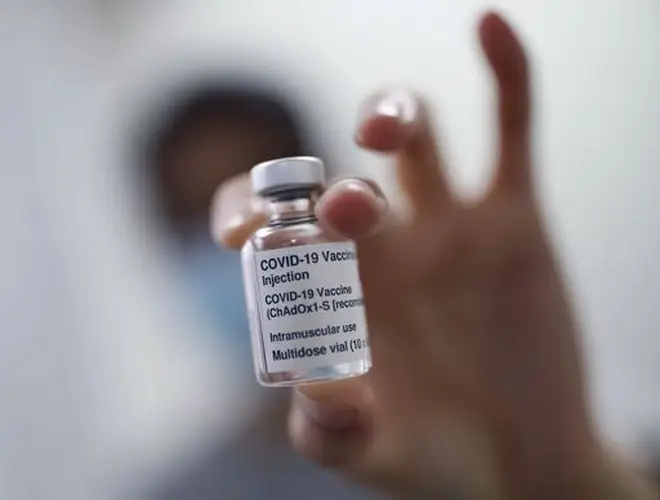
Ian Payne 4am - 7am
23 April 2021, 18:49

Vaccines should be able to control the Covid-19 pandemic, experts have said, after new data showed vaccine jabs reduce infection rates.
New real-world UK data has been published, and shows that Covid-19 vaccine jabs slash infection rates and are likely to cut transmission.
The data shows that having just one dose of either the Pfizer/BioNTech or AstraZeneca vaccines leads to a two-third drop in coronavirus cases, and is 74% effective against symptomatic infection.
After two doses of Pfizer, there was a 70% reduction in all cases and a 90% drop in symptomatic cases. The latter are the people who are most likely to transmit coronavirus to others.
Currently experts are still collecting data on two doses of AstraZeneca.
READ MORE: Covid: Climber becomes first to test positive at Mount Everest
One of the new studies, which has yet to be peer-reviewed, is based on data from the national Covid-19 Infection Survey run by the University of Oxford and the Office for National Statistics (ONS).
It included a random sample of more than 373,000 adults from across the UK, who produced more than 1.6 million swab test results between December and April.

India-based caller tells LBC of the 'real fear' as Covid worsens
Dr Koen Pouwels, senior researcher at Oxford University's Nuffield Department of Population Health, said the experts were "fairly confident" that the vaccines reduced onward transmission of the virus.
"However, the fact that we saw smaller reductions in asymptomatic infections than infections with symptoms highlights the potential for vaccinated individuals to get Covid-19 again, and for limited ongoing transmission from vaccinated individuals, even if this is at a lower rate," he said.
"This emphasises the need for everyone to continue to follow guidelines to reduce transmission risk, for example through social distancing and masks."
READ MORE: Covid-19 levels across the UK at lowest level since Autumn

Frustrations over Covid funeral limits
Professor Sarah Walker, from the University of Oxford and chief investigator for the survey, said the study suggested vaccines could reduce transmission and were also effective against the Kent variant of coronavirus.
She said: "Showing that the benefits are greater both for people with high viral load and for people with symptoms, both of whom have probably got the greatest chance of onward transmission, was really not necessarily something I was expecting and... I was pleasantly surprised."
READ MORE: India added to red list after new virus strain detected
The data showed a 57% drop in infections among people not experiencing symptoms after one vaccine dose.
Prof Walker said she was "cautiously optimistic" that the pandemic could be controlled long term with vaccines.
She said that "lockdown isn't a viable solution" in the long term and vaccines are "clearly going to be the only way that we are going to have a chance to control this long term."
However, she said the "virus is very good at throwing us curveballs" and "we're always going to be one small step away from the potential for things to go wrong again".

Caller who sells ventilators criticises Government purchasing
In a separate study published by the team, it found one dose of AstraZeneca or Pfizer produced "strong antibody responses" in 95% of people given a vaccine.
While the Pfizer and AstraZeneca jabs behave differently in the early stages, both vaccines produced antibody levels that were sustained for at least 10 weeks.
Professor David Eyre, from the University of Oxford, said this supported the UK's decision to delay second doses by up to 12 weeks.
READ MORE: Wales to bring forward some lockdown relaxations by two weeks
Two doses of the Pfizer/BioNTech vaccine were also found to offer similar levels of protection against Covid-19 as for people who had had Covid previously.
The data also showed that vaccination was just as effective in people over 75 or with underlying health conditions, as it was in those without or who were under 75.